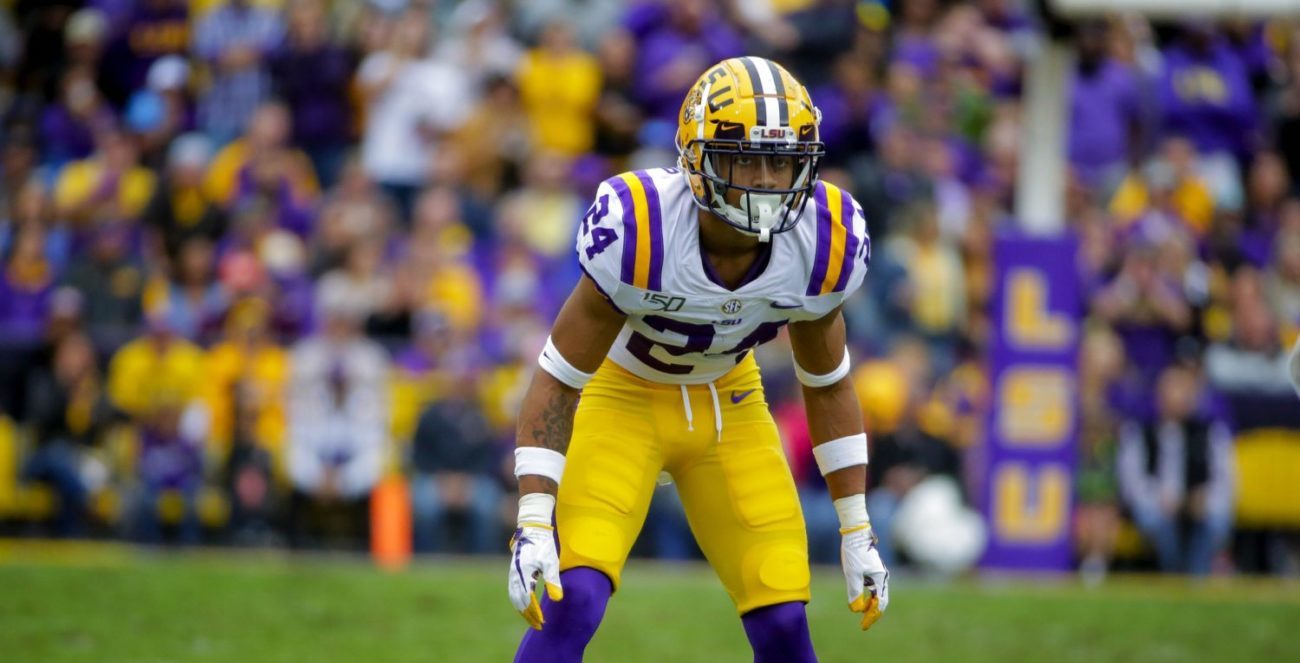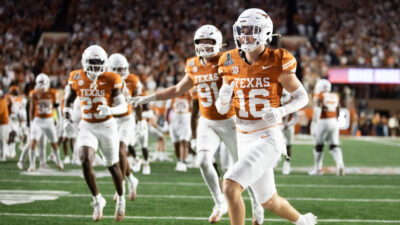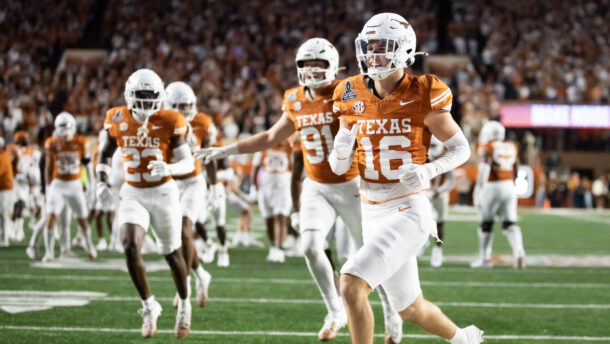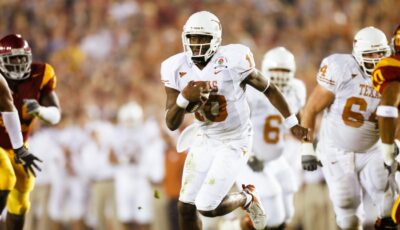
Will Derek Stingley Jr. become the G.O.A.T. of SEC defensive backs? Here’s what he’s up against
In 2019, I did something for the first time in my life watching college football.
I watched a true freshman and decided, yep, that dude is an All-American. Without question.
If you were fortunate enough to watch Derek Stingley Jr. up close in 2019, you probably had that same moment of clarity. Three times I saw Stingley play in person, and in each instance, he did something that showed why he was an All-American.
There was the time when he shook off his first career muffed punt early in the Auburn game by responding with a body-turning, jaw-dropping, game-changing interception. There was the time when he broke up a Georgia touchdown and also picked off not 1, but 2 passes en route to a dominant SEC Championship win. And there was also the time when Oklahoma moved All-American and future first-round pick CeeDee Lamb off Stingley (Lamb called Stingley the best cornerback he saw in his entire time in college).
And again, those are only the moments I saw in person. There were countless other moments that contributed to Stingley becoming an All-American as a true freshman.
Want a confession? I actually declared Stingley an All-American during the middle of the first game I saw him play in person. Specifically, it was after the aforementioned body-turning, jaw-dropping, game-changing interception:
Derek Stingley vs. Auburn:
2-of-10
50 yards
0 TDs
1 INT
8.3 NFL Passer RatingAs a wise man once said: “Never throw at Derek Stingley”pic.twitter.com/4g58ya83Sq
— Cody Worsham (@CodyWorsham) October 27, 2019
So yes, Stingley was the first true freshman who I watched in person and undoubtedly thought was an All-American. Granted, Herschel Walker’s true freshman season happened 10 years before I was born. Herschel is considered by many the “G.O.A.T.” of SEC football. (I didn’t say “everyone,” Auburn fans.) He did things that we had never seen before as a true freshman. I’d argue the same was true of Stingley, who was Pro Football Focus’ most valuable non-quarterback since they started charted rankings.
A freshman year like that begs the question — what does Stingley have to do in order to become the best SEC defensive back ever?
What a question that is to ask about an 18-year old kid. It’s by no means jumping the gun to dig into the G.O.A.T. discussion already.
Stingley is well on his way to being regarded in the same light as all-time great SEC defensive backs like Tyrann Mathieu, Patrick Peterson, Minkah Fitzpatrick and Vernon Hargreaves. For my money, those were the conference’s top defensive backs in the 2010s.
(The crazy thing is I gave Peterson the nod in the 2010s All-Decade team even though he only had 1 season during that timeframe. Stingley also only had 1 season, and you could make the case it was better than what Peterson did in 2010.)
If we’re trying to figure out who the SEC’s best defensive back ever is, we have to give an edge to the 21st century players. It’s more difficult to play the position in an era when quarterbacks throw the ball 30 times a game. It just is. With all due respect to greats like Tommy Casanova, Bobby Majors and Scott Woerner, in order to be considered a G.O.A.T. at the defensive back position, players in the past 30 years get the edge.
To say that the likes of Champ Bailey, Eric Berry and Morris Claiborne played in wildly different eras would be an understatement. Actually, some might even argue that defensive backs from the 1990s like Bailey, Antonio Langham and Lawrence Wright shouldn’t be part of the G.O.A.T. conversation for SEC defensive backs because of how much the game changed in the past 20 years. Passing offenses got better. Much better.
Stingley’s path to becoming the best SEC defensive back of all-time won’t be simply whether he finishes his career with the most interceptions. In all likelihood, he won’t break Chris Williams’ SEC record of 20. Sooner or later, teams will realize that throwing against Stingley doesn’t make sense. The 6 interceptions he had in 2019 could easily wind up being the highest single-season total of his career. That doesn’t matter. He could still — dare I say — improve and watch that number decrease each of the next 2 years.
As we know, interceptions aren’t the only way we can measure defensive backs. Thanks to analytics-based publications like Pro Football Focus, we can see beyond that. For example, we can see that Stingley was the nation’s highest-graded defender in single coverage in 2019, or we can see that even though he saw a whopping 94 targets (2nd in the country), he allowed a catch rate of 38.3%. Fair or not, that’ll add more perspective for Stingley’s career than it did for many of the aforementioned greats who are in the running for G.O.A.T. of SEC defensive backs.
Yes, Alabama fans. DeVonta Smith had himself a day against Stingley. And in the first half against Florida, Van Jefferson did well against the true freshman.
But outside of those moments, Stingley spent the entire season forcing offensive coordinators to rethink their game plans. Whether that was moving an elite receiver to the slot instead of on an outside island against Stingley or just looking to the other side of the field altogether, Stingley made teams pay week in, week out. When he had rare mistakes, he almost always bounced back within the game with a huge play (the interceptions against Auburn and Florida were both basically made in the end zone).
If Stingley so much as repeats his 2019 performance (in terms of the analytics) the next 2 years, yes, he’ll be the best defensive back in SEC history. In order for that to be a somewhat unanimous opinion — no G.O.A.T. debate is ever truly unanimous — there are a handful of accolades he must acquire:
- Jim Thorpe Award
- Bednarik Award
- 2 more first-team All-SEC honors
- 2 more first-team All-America nods (he earned first-team honors from 6 publications in 2019)
If Stingley becomes the first SEC player to win consecutive Thorpe or Bednarik Awards, shut it down. The discussion is over. I’d argue becoming a 3-time first-team All-American would certainly make him G.O.A.T.-worthy, as well. As great as Mathieu, Peterson, Bailey and Berry were, they never were 3-time All-Americans.
Berry was the only unanimous 2-time All-American of that group (take that for what it is because Mathieu not being a unanimous All-American in 2011 is a crime). Stingley matching that feat would absolutely help in the G.O.A.T. argument.
For the sake of this argument, we’re not going to put much stock into special teams exploits. Would a Paul Hornung Award improve Stingley’s career résumé? Sure, but Stingley’s status as the G.O.A.T. of SEC defensive backs shouldn’t come down to whether he can become a better punt returner than Mathieu — I wouldn’t rule that possibility out — or if he can become an offensive playmaker like Bailey.
When Stingley’s college career eventually comes to a close, the question will be whether he played the defensive back position better than any SEC player who came before him. Did he continue to make plays that show off ball skills at an All-Pro level? Did he take away an entire side of the field? Did he continue to come up clutch for a team in pursuit of a national title?
We don’t have those answers yet. But whether you watched Stingley in person or just saw him on TV, you probably came away from the 2019 season with an obvious question.
Who would be foolish enough to bet against that guy?
Connor O'Gara is the senior national columnist for Saturday Down South. He's a member of the Football Writers Association of America. After spending his entire life living in B1G country, he moved to the South in 2015.







